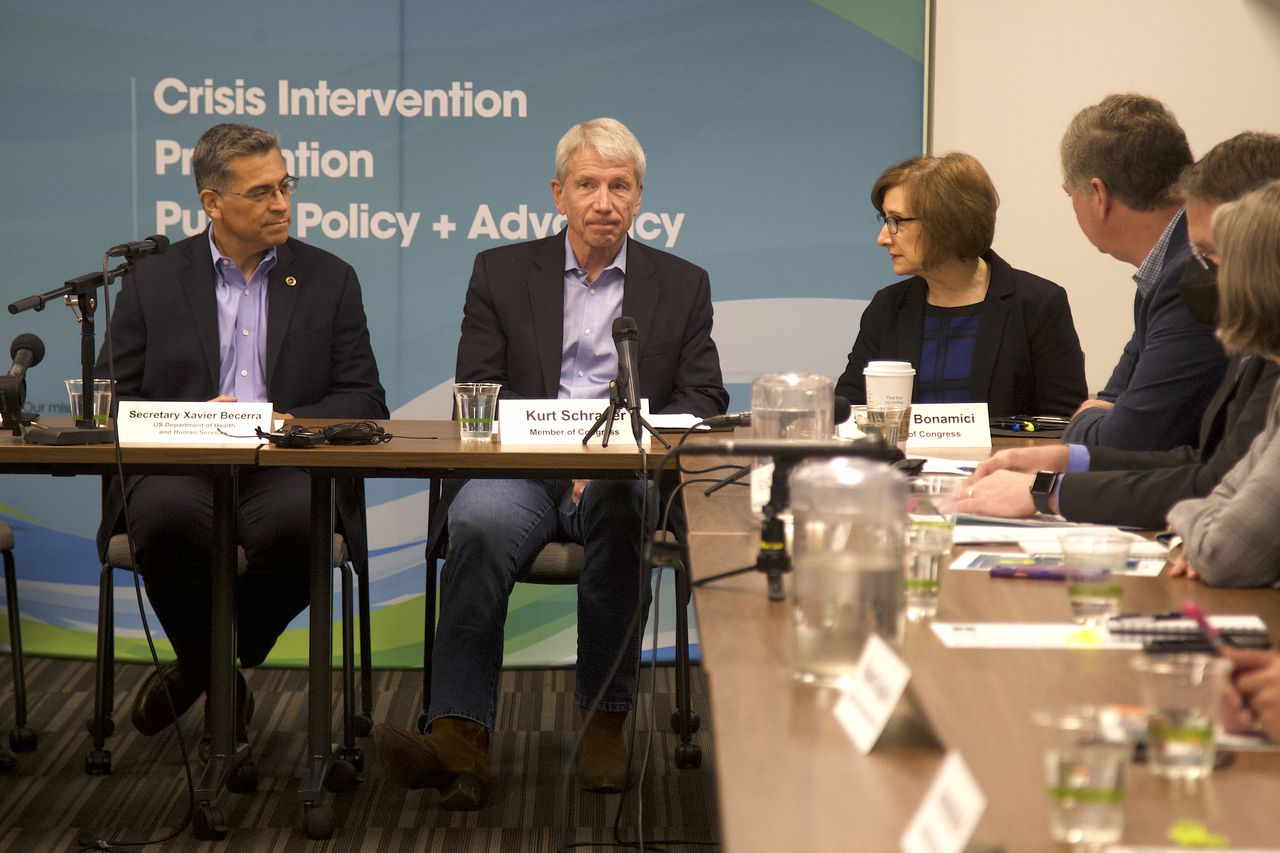A top official in the Biden administration visited Portland Thursday to find out how young Oregonians are working to prevent suicide and help fellow teenagers in crisis.
The U.S. Secretary of Health and Human Services, Xavier Becerra, spent nearly two hours at the Lines for Life offices in Southwest Portland, hearing first from Oregon officials and advocates, then youth who staff a crisis hotline called Youth Lines.
One teen volunteer described connecting with a person in crisis through a two-hour conversation. Another said helping young people with mental health problems helps her process her own problems. Another said the young people she helps value talking to someone young, like her.
“It can be hard to reach out to older people. They are removed,” Rhi, a volunteer who asked that her last name not be used to protect her privacy at school, told the high-ranking politicians. “For some people, maybe it’s been, like, 30 years since they took a math test.”
Becerra listened silently, as did Gov. Kate Brown and three of Oregon’s representatives in Congress.
“I’m, like, blown away by this program,” Brown said after several of the teenagers shared their experiences.

U.S. Health and Human Services secretary Xavier Becerra met with top Oregon politicians and more than a dozen people involved in mental health to talk about Oregon’s mental health system.
Thursday’s event was part of a multi-state tour by Becerra to highlight the president’s proposed multi-billion budget for mental health. Becerra later met with local Planned Parenthood and will be in Washington on Friday.
Oregon was an important stop, not only because it has consistently ranked among the worst for mental health treatment access nationally, but also because it has recently invested hundreds of millions to improve access to care.
Mental Health America this year ranked the state 45th for prevalence of mental illness among youth and access to treatment. But in 2021, the state legislature allocated about $1 billion towards behavioral health That money, and the additional approximately $200 allocated this year, is intended to shore up some of the core issues driving lack of access to care, including $130 million to raise wages for mental health workers and $130 million to add treatment beds.
More than a dozen people involved in Oregon’s mental health system, including local elected politicians, mental health advocates and school counselors, sat down with the secretary Thursday to describe Oregon’s challenges and to ask the secretary for help.
They described a dearth of behavioral health workers, stigma around mental illness and concerns that physical health remains prioritized over mental health.
Randy Kamphaus, acting executive director of a recently opened institute for children’s mental health, in Portland, said crisis prevention should be improved, given how many young people are “suffering in silence” because their parents don’t recognize mental health symptoms.
The president-elect of the Oregon School Psychologists Association lamented the need for more school psychologists. The recommended ratio is one psychologist to 500 students, Karley Strouse said. In Oregon, the actual ratio is one psychologist for every 1,400 students.
“There’s not enough of us in the state,” Strouse said.
Becerra said the Biden administration sympathizes with the challenges, and he commended the work Oregon is doing with the 988 call center, a suicide prevention line that is scheduled to become available nationally July 16.
“There are so many lives that are perishing because we just aren’t catching them,” Becerra said. “They want to be caught.”
But Becerra said much rides on whether the mental health component of Biden’s budget passes. Asked whether that’s likely, U.S. Rep. Kurt Schrader of Oregon sounded a hopeful note.
“Mental health is not a partisan issue,” Schrader said.
Becerra added: “Keep your fingers crossed.”
— Fedor Zarkhin
Note to readers: if you purchase something through one of our affiliate links we may earn a commission.
